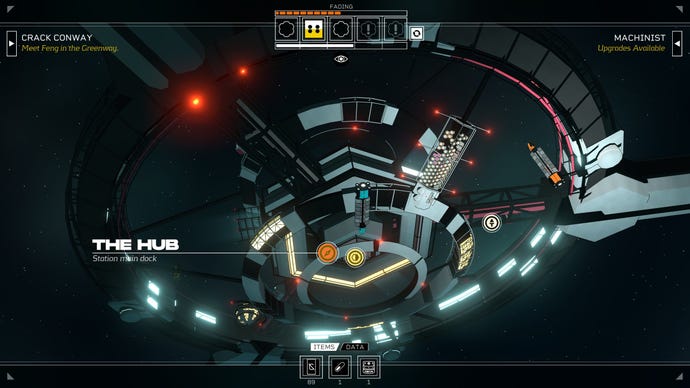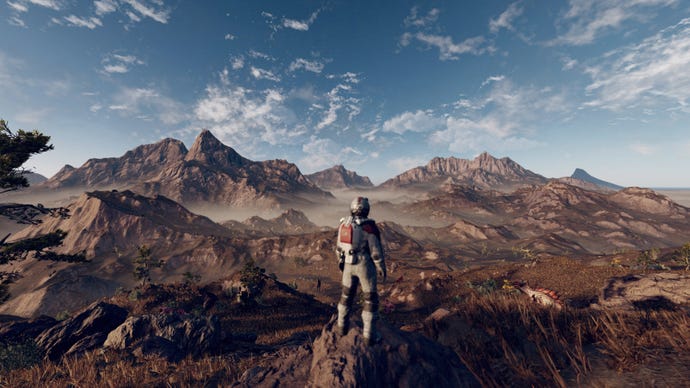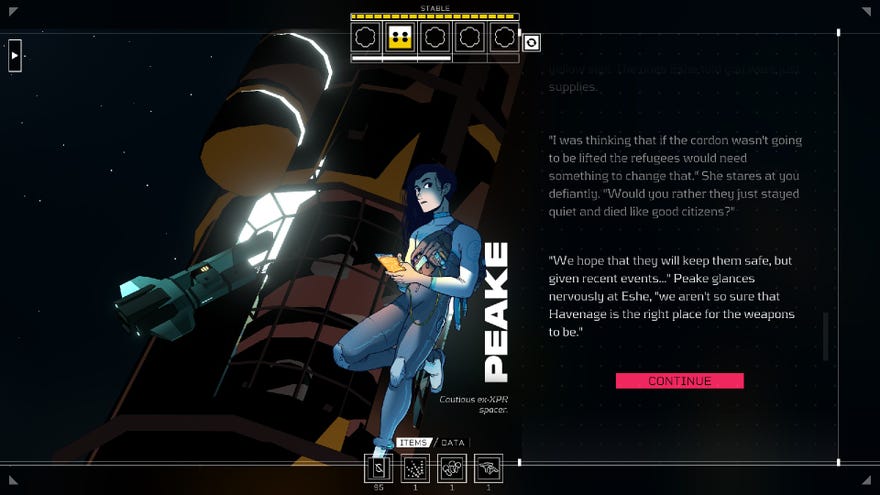Citizen Sleeper made me realise that I don't really need Starfield
And helped me process some of my anxiety
I toyed around with this intro a lot, because I didn’t want to start with a super pessimistic bang. But, for lack of a nicer way to put it, I’ll simply say things are looking pretty scary out there, huh? Capitalism is failing, the economy is crumbling, and normal people have nothing left to give. It’s something I've been thinking about a lot lately, but I don’t really talk about it. I keep it all inside, like a microwave holding a ball of tin foil while it spins on full power.
At least, that was the case until I played Citizen Sleeper. It’s a rather simple RPG inspired by tabletop roleplaying games, giving you a limited number of action dice that you can spend each day to receive consequences. Mechanically, it doesn’t stretch much further than those actions and consequences, meaning I can instead focus on connecting with characters. In its simplicity, I found a cathartic way to process my thoughts on lots of scary stuff happening in our actual world. I also realised that Starfield, the big space game looming on the horizon which I was previously pretty excited about, just doesn’t seem appealing anymore.
If you didn’t read Brendy’s review (or just forgot because it’s been a while), then Citizen Sleeper is an RPG in which you play a Sleeper. That’s sci-fi talk for the consciousness of a sleeping human placed into a robot body, which was provided by a scary corporation called Essen Arp. Your Sleeper has run away from Essen Arp and found refuge on a near-derelict space station known as the Eye, causing the big corpo to chase you down with some very big corpo energy. Add in some sci-fi vibes and strong themes of oppression and exploitation, and you’ve got a space capitalism adventure. Hence all the political talk!
Spending time on the Eye involves an awful lot of jargon-filled sci-fi lore, but beneath the spiel are problems that don’t feel alien. People are exploited by companies that promise everything and follow through on nothing. Even when you do earn money, it’s spent simply trying to keep yourself alive with nothing left over. Refugees are left to starve on the outskirts, while the suits discuss their existence from a distance. Through all of this, anxieties and stress run rife among the workers, with little care extended from the top. Work, eat, sleep, repeat. Citizen Sleeper’s incredibly unembellished gameplay loop emphasises that process, with exploration of the Eye stripped down to a simple scroll of the mouse wheel.

That might make Citizen Sleeper seem like a slog, but it's actually the opposite. It tackles a lot of tough topics, but it's the characters who're front and centre. My personal faves, a father/daughter duo named Lem and Mina, have a story filled with hope. They dream of joining a ship set to colonise a nearby planet, and so Lem must take sporadic shifts at the local shipyard. I spent a lot of my initial playthrough bonding with and caring for Mina while Lem worked. Despite seeing the difficulties they were facing each and every 'cycle' (a day in Citizen Sleeper), my connection with Mina made me desperate to help them realise that dream. There are problems to face, and thinking about them helped me process my own feelings, but Citizen Sleeper is a game filled with hope and endlessly endearing charm.
Citizen Sleeper's simplicity is its biggest strength in that regard, in the same way that it might be for a visual novel, because there are less mechanical barriers between the player and the events occurring on screen. It’s easy to form a connection with a character when there’s very little else to interact with as a distraction. There’s no open universe exploration, ship customisation, or FPS combat to get lost in. Comparing that simplicity to the vast sea of systems that’ll come together in Starfield makes me feel uneasy. Starfield will probably be chock full of radiant quests to complete, with an endless sea of RNG gear waiting as rewards.

To be fair, I'm not particularly opposed to that. Starfield’s huge open worlds and continuous stream of content might numb my anxious feels and give me a short-term distraction, which I'd probably appreciate most of the time. But, after trying to numb myself to everything that's happening for so long, I’m not sure I necessarily want that anymore. Maybe I'll feel differently when it rolls around next year, but right now the idea of endlessly wandering and shooting and wandering between quest markers in space seems tedious.
Citizen Sleeper helped me think about some scary world problems, but I was fortunate that my playthrough was also filled with hope. Maybe it helped me process some of my own anxious feelings in a positive light. At least I got to think about it without adding to anyone else’s stress. If anything, I'm just glad it acknowledged those problems and prompted me to think about them, rather than constantly shovelling another outpost that needs defending down my gullet.









